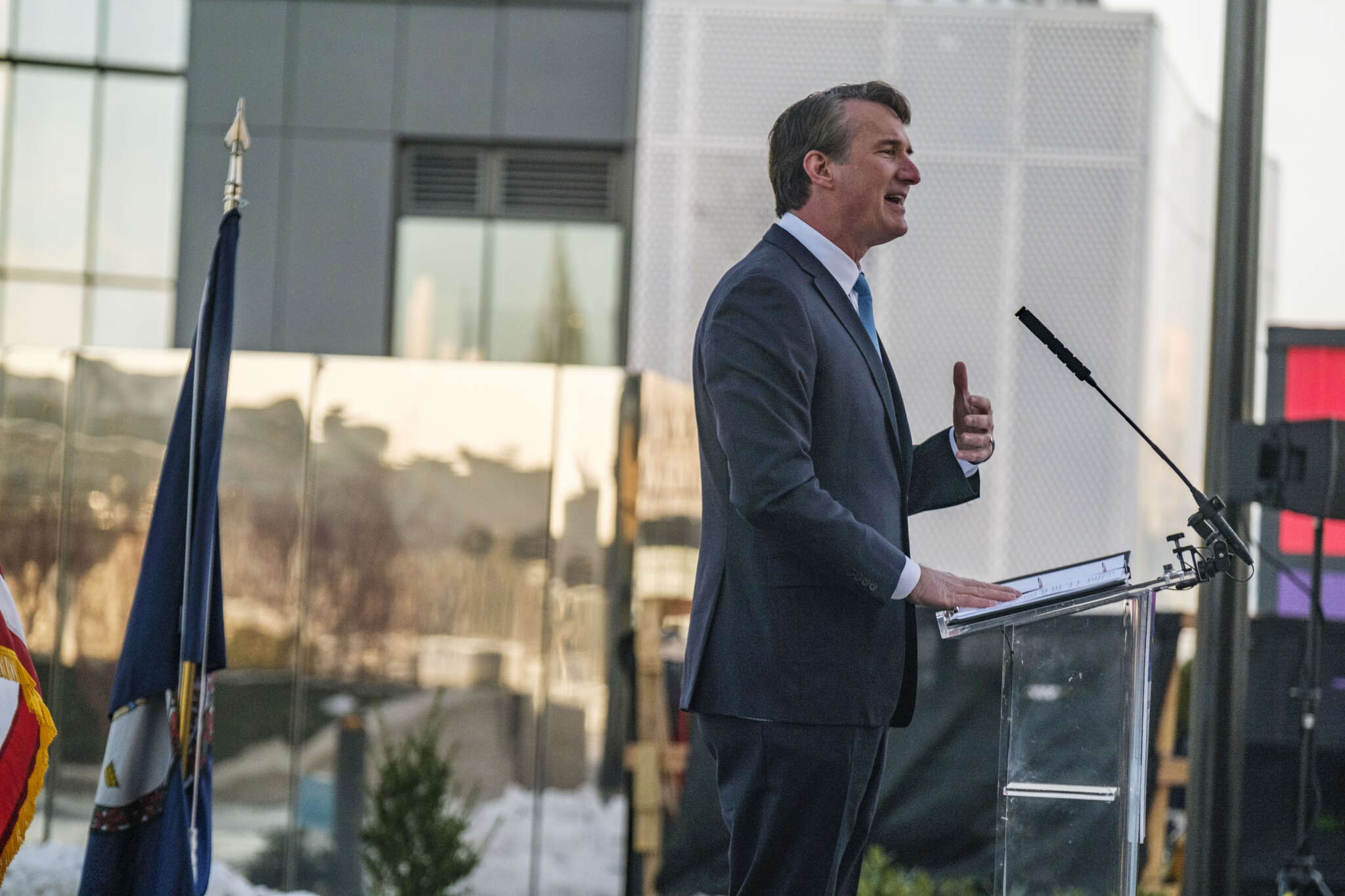
A bill to raise Virginia’s minimum wage got the ax in Richmond despite the support of three Fairfax County state senators.
Gov. Glenn Youngkin (R) vetoed legislation on March 28 that would’ve increased the minimum wage from $12 to $15 an hour by 2026. Sens. Jennifer Boysko, Saddam Salim and Adam Ebbin, who all represent parts of Fairfax County, were among several Democrats to sponsor the bill.
The governor also struck down a bill sponsored by Ebbin (D-30) that would have legalized the sale of recreational marijuana in Virginia.
Ebbin said he was “disappointed but not surprised” by the decisions and sees no reason to believe Youngkin will change his mind in future years.
“We need a Democratic governor to sign these bills,” the senator said.
The minimum wage bill would’ve boosted the rate to $13.50 an hour starting Jan. 1, 2025 before reaching the full $15 in 2026. Youngkin argued that his veto protects small businesses in parts of Virginia outside of the D.C. suburbs.
“The free market for salaries and wages works,” the governor said. “It operates dynamically, responding to the nuances of varying economic conditions and regional differences. This wage mandate imperils market freedom and economic competitiveness.”
A minimum wage increase “may not impact Northern Virginia, where economic conditions create a higher cost of living,” Youngkin added.
Salim (D-37), whose district includes Tysons, Vienna and the cities of Fairfax and Falls Church, disputed Youngkin’s claims, calling the veto “deeply disappointing and detrimental to the well-being of workers and struggling families across Virginia.”
“Our current minimum wage is not a living wage, particularly here in Northern Virginia,” he said. “I believe that every worker deserves a living wage. By rejecting this bill, the governor is essentially endorsing policies that grow economic inequality and hardship.”
Democrats in the Virginia Senate will continue to fight for a minimum wage increase next legislative session, Salim said.
Boysko (D-38), who represents Reston, Herndon, Great Falls and McLean, argued that the current minimum wage is part of a “cruel system” that forces many people to “scrounge for benefits” from the state and nonprofits, contributing to Virginia’s workforce shortage.
“Many businesses are not paying a living wage,” Boysko said. “If employers cannot figure out how they would live on what they pay their employees, we have an economic problem and a moral problem.”
For the marijuana bill veto, Youngkin pointed to adverse health effects associated with the substance. He argued that even medical cannabis has had “perverse and dangerous consequences” akin to opioids.
“Attempting to rectify the error of decriminalizing marijuana by establishing a safe and regulated marketplace is an unachievable goal,” he said. “The more prudent approach would be to revisit the issue of discrepancies in enforcement, not compounding the risks and endangering Virginians’ health and safety with greater market availability.”
Virginia became the first Southern state to legalize marijuana possession in 2021 after then-governor Ralph Northam, a Democrat, signed a bill intended to set the stage for recreational sales to adults starting in 2024. Proponents characterized the move as a necessary corrective to address racial disparities in the enforcement of marijuana crimes.
Ebbin, whose district includes Bailey’s Crossroads and Seven Corners, argued that marijuana is less harmful than alcohol and that preventing its legal sale only encourages people to turn to illegal sources.
“It’s an adult choice that some adults make, and we don’t need a black market,” he said.
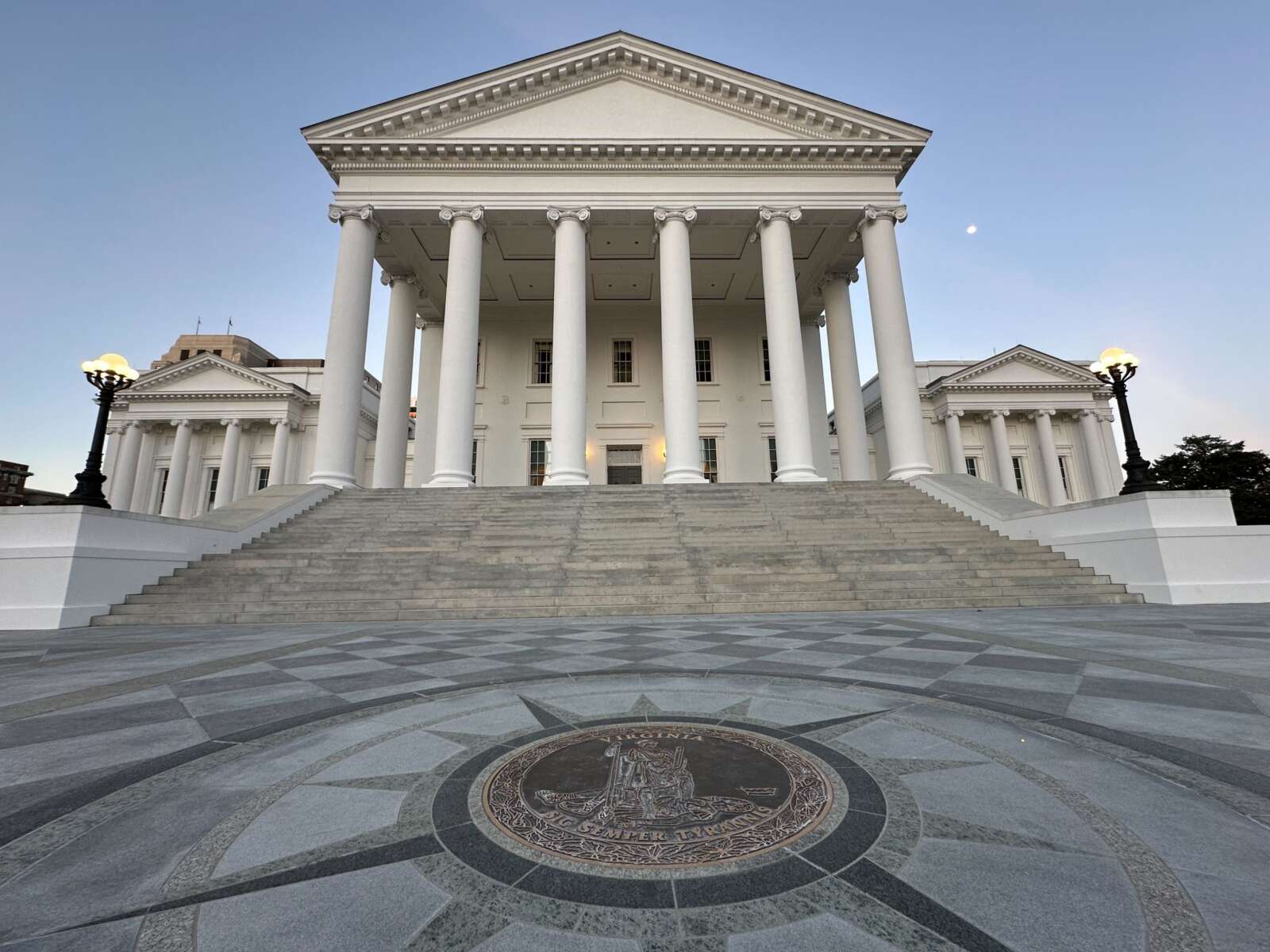
Without taking a recorded vote, a Virginia House of Delegates committee on Wednesday [Feb. 27] again blocked legislation that would bring the state in line with the rest of the country by banning the personal use of campaign funds.
By a voice vote, the House Appropriations Committee chose to continue the bill until the 2025 General Assembly session.
“It is our hope that during the course of the 2025 session that both Senator Boysko and Delegate Simon will be able to come back to us and bring us a piece of legislation that not only do I want to see passed out but the speaker would like to see passed out as well,” said House Appropriations Chairman Luke Torian, D-Prince William.
He was referring to Sen. Jennifer Boysko, D-Fairfax, and Del. Marcus Simon, D-Fairfax, who were spearheading efforts (link added by FFXnow) to craft a law that would clarify campaign funds have to be used for legitimate political activity and cannot be used on personal expenses such as mortgage payments, school tuition, vacations, clothing and cars.
Torian’s committee did not docket Simon’s bill earlier in the session. Boysko’s bill had passed the state Senate 35-4, and Wednesday’s hearing was a do-or-die moment for her version as lawmakers prepare to wrap up the session [this] week.
Del. Mark Sickles, D-Fairfax, said he would “reluctantly” second the motion to punt the bill to 2025.
The proposed ban, which has been blocked for years, is pitched as a basic good government measure that would prevent politicians from funding their personal lives with money given to them by corporations and wealthy donors.
Previous promises to work on the issue at a later date haven’t been borne out.
In 2021, the General Assembly created a special subcommittee to study campaign finance reform, and the personal use ban was considered one of its top priorities. That subcommittee barely met in 2021. The legislature re-upped it for another year, but the panel never held a meeting in 2022.
The subcommittee — which never produced a final report — is now listed as inactive.
This article was reported and written by the Virginia Mercury, and has been reprinted under a Creative Commons license.
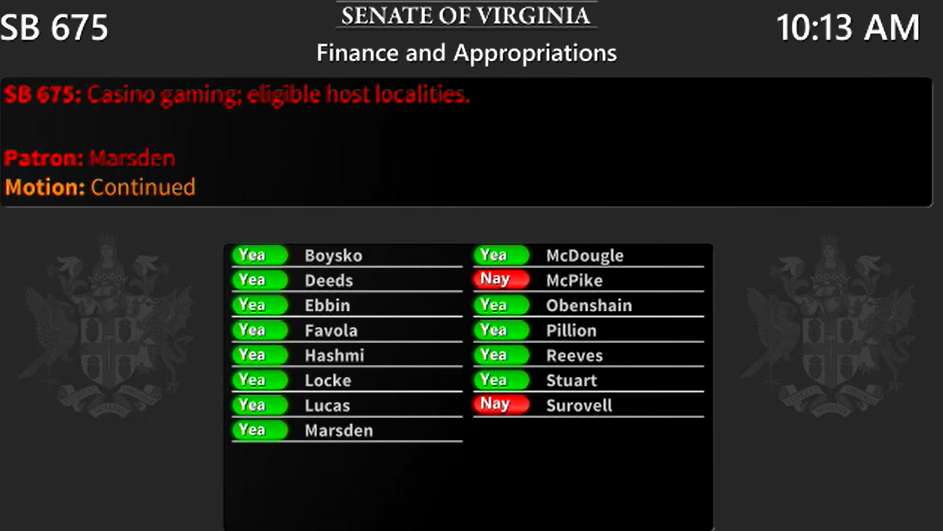
Consideration of legislation to make Fairfax County eligible for a casino has officially been put on hold until 2025.
The Virginia Senate Finance and Appropriations Committee voted 13-2 this morning (Tuesday) to continue Senate Bill 675 to next year, affirming a recommendation made last Thursday (Feb. 1) by its resources subcommittee.
The vote came after a failed effort by state Sen. Jennifer Boysko (D-33) to more forcefully table the bill from Sen. Dave Marsden (D-35), who has advocated for a casino in Tysons specifically as a potential revenue boost for both Fairfax County and the state.
Urging her fellow committee members to pass the bill by indefinitely, Boysko says “hundreds and hundreds” of local community members had voiced opposition to a possible casino at a town hall she and other representatives of the Reston and McLean areas held on Saturday (Feb. 3).
The town hall drew over 400 people, according to Boysko’s office. The senator told FFXnow that she has also received “thousands and thousands of letters and emails and calls from constituents” opposed to a casino.
“We’ve heard [the opposition] all year long,” Boysko said at the committee meeting, recalling a doctor’s appointment she had last summer where the doctor told her that he didn’t want a casino in the area. “…I ask my colleagues to respect the will of the neighbors I have.”
In addition to emphasizing the opposition from area residents, Boysko and Sen. Barbara Favola (D-40) warned that Marsden’s bill sets a new precedent for determining where casinos can be built in Virginia.
The five localities currently eligible for a casino — Portsmouth, Danville, Bristol, Norfolk and Richmond — all requested that authority from the General Assembly, as has Petersburg, which is being considered as a replacement for Richmond after the voters in the state capital rejected a referendum twice.
Though they didn’t officially oppose the legislation, Fairfax County leaders have stressed that they didn’t ask for the county to be added to the list of eligible casino hosts and weren’t consulted about the proposed development.
SB 675 also deviates by laying out criteria that limits potential sites for a casino to somewhere in Tysons near a Silver Line Metro station outside the Capital Beltway. Comstock is reportedly eying the abandoned Exclusive Automotive Group lot at 8546 Leesburg Pike, according to Marsden.
“This would set a precedent that is very different from our current framework, and I don’t want to go down that path,” said Favola, who represents Arlington.
However, Marsden argued that a casino would bring in substantial new revenue at a time when offices are struggling and Metro needs more funding from Virginia, D.C. and Maryland to avoid potentially drastic budget cuts.
The envisioned casino development from Comstock would also include a conference center, hotel and concert venue, he noted.
“There’s no reason right now for people to come to Fairfax County,” Marsden said. “…We don’t get visitors, we don’t have tourism.” Read More

Amid a docket of new policy proposals, a Virginia Senate panel heard a familiar one Monday when Sen. Jennifer Boysko again presented legislation to require employers to list a wage or salary range in all job postings and prohibit them from asking prospective employees for a salary history.
“This is the eighth time I have introduced this legislation,” Boysko told the Senate Commerce and Labor Committee before vowing to keep reintroducing the measure until it reaches the governor’s desk.
Boysko has pitched Senate Bill 370 as a way to help remedy gender pay gaps by deterring employers from relying on prior salaries to craft future compensation. The idea is that because women in Virginia as a group still make less than men, basing salary offers on past wages could perpetuate those disparities.
“Salary history is often a reflection of past discrimination,” Emily Yen, a lobbyist for the Virginia Education Association, told lawmakers.
Last April, the U.S. Bureau of Labor Statistics reported that in Virginia, the median usual weekly earnings of women who worked full-time were 80% of what their male counterparts received. Full-time workers were considered people who usually worked 35 or more hours per week at their sole or principal job.
Women’s labor advocates have also argued requiring employers to disclose wage or salary ranges provides needed transparency that can dampen inequalities by putting male and female applicants on more equal footing in compensation negotiations.
“When employers negotiate without giving salary range information to job applicants, applicants are more likely to rely on their past pay as a negotiation reference point, which perpetuates existing pay gaps,” wrote the National Women’s Law Center in a brief.
Boysko’s legislation would not prohibit prospective employees from “voluntarily disclosing wage or salary history, including for the purpose of negotiating wages or salary after an initial offer of employment.”
Employers who violated the new rules would be subject to civil penalties of between $1,000 and $4,000, depending on their history of violations, as well as potential damages.
The Senate committee passed Boysko’s legislation on a 9-6 party-line vote after concerns from Republicans about whether the bill offered employers a right to appeal any violation determinations by the state Commissioner of Labor and Industry.
“If you’re having a penalty, you should be able to appeal it to a court,” said Senate Minority Leader Ryan McDougle, R-Hanover.
The bill was amended in committee to outline an appeals process. It now heads to the Senate Finance and Appropriations Committee for review.
Photo via Tim Gouw on Unsplash. This article was reported and written by the Virginia Mercury, and has been reprinted under a Creative Commons license.
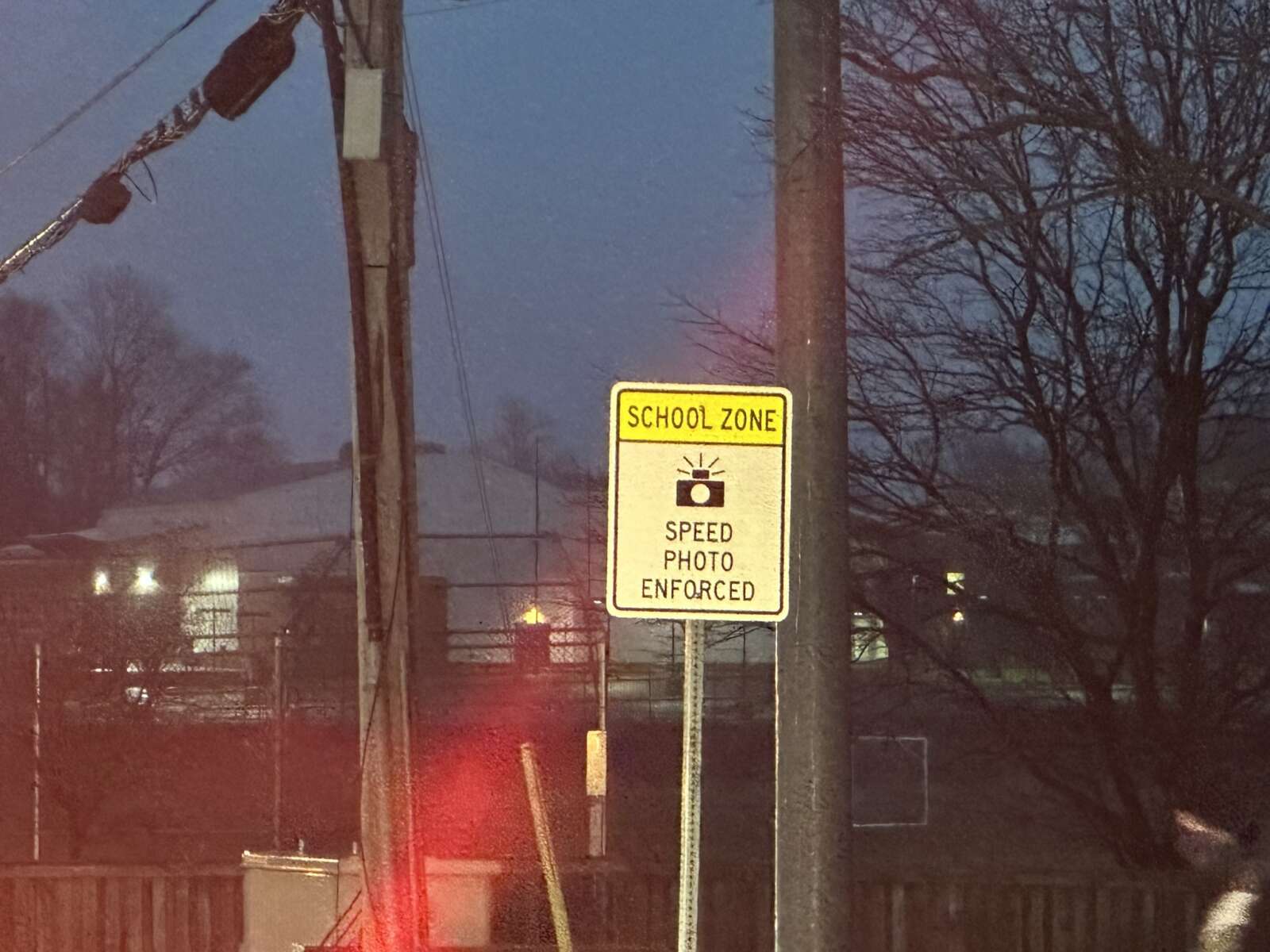
When they reconvene this month, Virginia lawmakers will consider a proposal to allow local governments to install speed cameras wherever they deem them necessary, with penalties of up to $100 for violations.
Bill patron Del.-elect Mike Jones, D-Richmond, said the legislation is intended to increase speed enforcement and reduce the number of traffic fatalities.
“It gives localities the decision of whether they want to do it or not,” said Jones. “So it’s not a ‘shall’ — every locality will have it — but for the ones that are concerned with this, it would help them out.”
State law currently allows local governments to install speed cameras in work and school zones as a way to drivers to go slower around children and construction workers. Jones’ bill would go further, allowing their placement in “any location deemed necessary” by local governments.
However, the use of more cameras to enforce speed laws has previously sparked controversy over privacy and public perceptions that the technology is just another way for a locality to raise revenue.
In November, amid a Frederick County debate, outgoing Supervisor Shawn Graber told the Mercury that “there should never be a time when a locality tries to simply put something in effect to make money from someone else’s misdoing.”
Jones said he understands the concerns, but argued people are asking for safer streets and safer neighborhoods.
“There’s not enough police for them and/or they don’t respond to neighborhoods simply because of numbers,” said Jones. “I understand the concern for the overpolicing, I get that. I get that as an African American male, I get that as pastor of an African American church, a Black legislator that represented predominantly Black and brown people. I hear that, but the reality is this: People aren’t dying in a lot of these different neighborhoods; where they’re literally dying is in mine.”
Virginia Department of Motor Vehicles data found that last year, 20% of the 122,434 crashes in the state were speed related, a 1% increase over the previous year. Virginia Department of Transportation crash data also shows that between 2018 and 2022, the annual number of traffic fatalities increased from 819 to 1,005.
The DMV said that on average, 2.8 lives are lost and 163 people injured every day because of traffic crashes.
Rob Billington, a spokesman for the Virginia Municipal League, which represents city and town governments in the commonwealth, said the league supports letting local governments expand the use of speed cameras on all roads at all times. He said traditionally VML has supported local flexibility, and it sees Jones’ bill as providing that. Read More
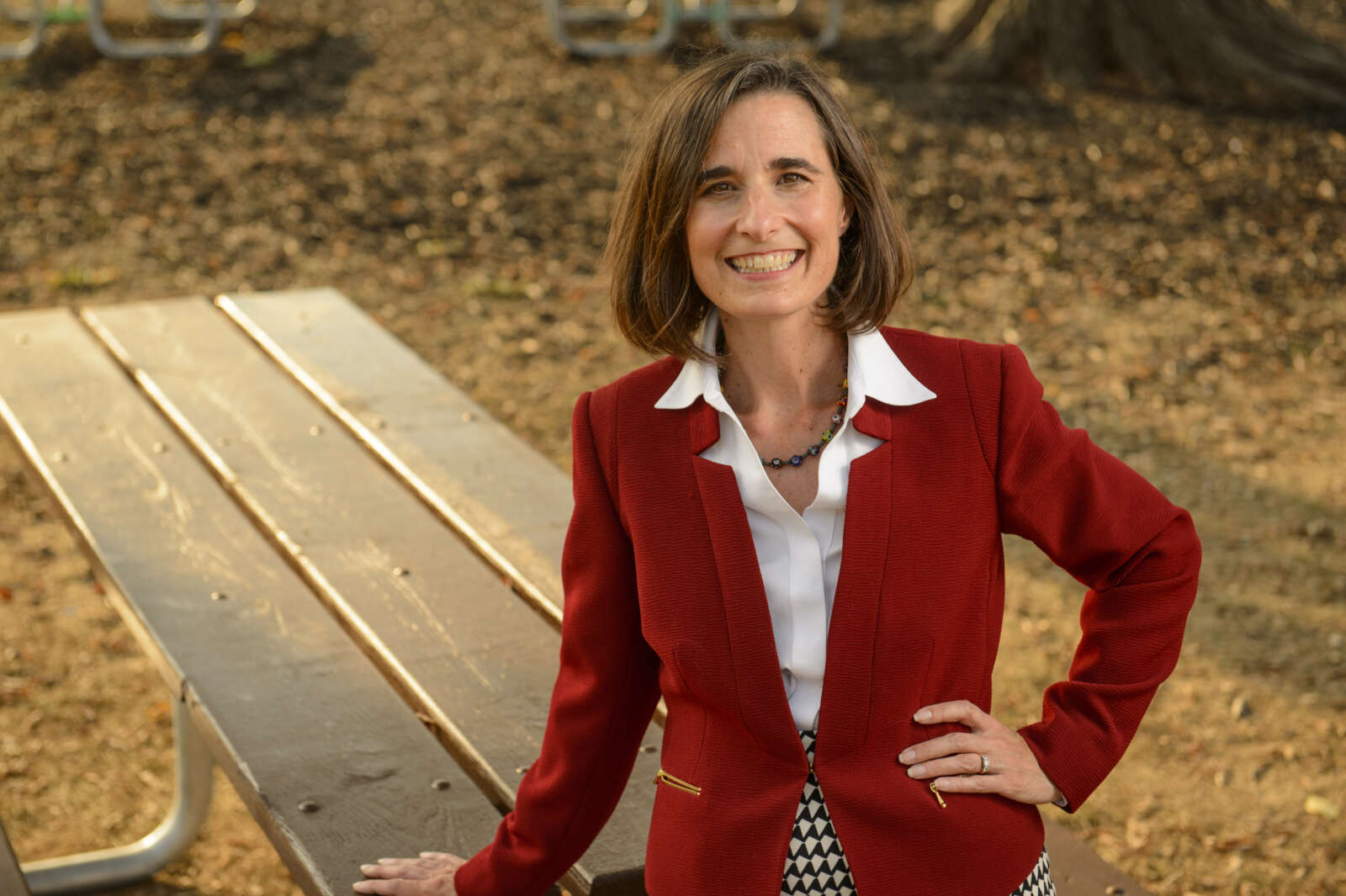
State Sen. Jennifer Boysko has joined the race to replace Rep. Jennifer Wexton as Virginia’s 10th Congressional District representative.
Boysko announced her candidacy today (Thursday), just two days after winning reelection as senator for the 38th District, which encompasses Reston, Herndon, McLean and Great Falls. The district includes portions of the former 32nd District represented by State Sen. Janet Howell, who opted not to seek reelection after redistricting paired her with Boysko.
“From the PTA to the state Senate, I’ve always brought people together to find common ground and work towards common sense solutions,” Boysko said in her campaign announcement. “In Washington, I’ll continue to build on the work of Congresswoman Wexton to bring a better future for our kids and make life better for Virginia’s workers and families. This grassroots campaign to fight for what’s right starts right here, right now. I ask for your vote.”
Boysko’s new campaign website highlights access to abortion, gun violence prevention and “economic policies that work for everyone and lift people up” as the issues central to her platform.
Boysko previously served in the House of Delegates, representing the 86th District from 2016 to 2019, when she got elected to the Senate to replace Wexton, who had just been elected to Congress in 2018.
Wexton said on Sept. 18 that she won’t seek reelection next year after getting a rare neurological disorder called Progressive Supra-nuclear Palsy. Initially diagnosed as Parkinson’s disease, the condition affects “body movements, walking and balance, and eye movements” and has no treatment, she said in her announcement.
Boysko’s competition for the 10th Congressional District — which covers Loudoun and Prince William counties — includes former House of Delegates speaker Eileen Filler-Corn and Mike Clancy, a Loudoun County resident, lawyer and business executive, per his campaign site.
Currently representing Fairfax County from Mantua to Burke as the 41st House District delegate, Filler-Corn announced this spring that she wouldn’t seek reelection, a move that prompted speculation of a potential run for governor. She launched her bid for Wexton’s seat on Oct. 18.
Clancy previously sought a Republican nomination for the 10th District in 2022.
With the Congressional election not coming until 2024, Boysko said in a statement to FFXnow that she remains committed to serving in the state legislature for the upcoming session, citing paid family medical leave as one of her top priorities:
I’ve had a lot of my constituents that have called and asked me if I would run for Congress. They believe that I’m the right person for the job, having represented half of Loudoun County over the past five years, having been in this community for 20 years, helping solve problems. I think my constituents want to see me work at a higher level as an asset and an ally in the Commonwealth of Virginia to make sure we’re getting stuff done.
As for the state Senate, the election’s not until next year, and I look forward to serving in this 2024 General Assembly Session. There’s a lot that I want to get done. Thanks to the hard work of our candidates, we just won the majority in the House and the Senate. I want to get paid family medical leave done at the state level, and I believe that I’ll be able to do that during this session. I’m looking forward to this next year.
Boysko filed a bill during the 2023 General Assembly session that would’ve established a statewide paid family and medical leave program, starting in 2026, but the legislation was left in committee.

